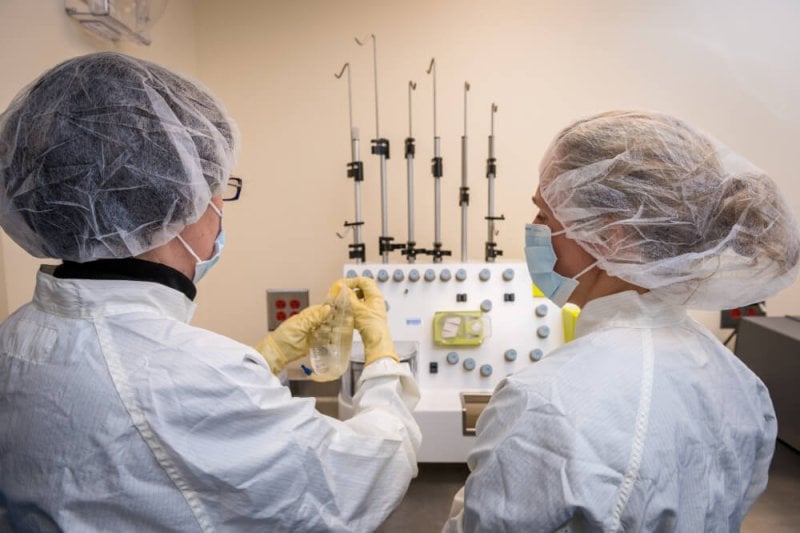CAR-T cell therapy is a treatment that uses existing immune cells from the patient’s body to destroy cancer cells. The patient’s T cells are taken from their blood and given a gene for a special receptor that targets and attaches to cancerous cells. This special receptor is known as a Chimeric Antigen Receptor (CAR). These new cells are geared specifically to attack the patient’s specific type of cancer. This means that CAR-T cells that are created for a patient with leukemia are not going to work for a patient who has adenocarcinoma. The new immune cells are grown in abundance for several weeks at a lab to later be infused into the patient’s body.
Once the cells have been reintroduced into the body, the patient must be closely monitored because of the potential for serious side-effects. Nausea, headaches and rash are all typical symptoms of cytokines being introduced. As the CAR-T cells begin to multiply, or if too many of these cells are reintroduced, extremely high fevers and low blood pressure may occur. This is known as Cytokine Release Syndrome (CRS). In a worst case scenario, it could cause potentially fatal brain swelling (cerebral edema).
Success of CAR-T cell therapy
Despite harsh potential side-effects, CAR-T cell therapy has shown promising results. In a recent clinical trial, young adults and children with acute lymphoblastic leukemia (ALL) were treated with a CAR-T cell therapy known as tisagenlecleucel or Kymriah. Cancer.net reports that of the 63 patients in this clinical trial, 52 went into remission. Of those 52, 75 percent have been in remission for more than six months. As of August 2017, tisagenlecleucel has been approved by the FDA to treat patients who suffer from acute lymphoblastic leukemia.
CAR-T cell therapy also has been used to treat large B-cell lymphoma. The therapy used in this clinical trial is known as axicabtagene ciloleucel or Yescarta. 82 percent of patients receiving this therapy had a positive response, with 54 percent showing no sign of cancer after treatment, according to Dana-Farber Cancer Institute. The institute also reported that 40 percent of patients remain in remission a year later.
Perhaps the most successful data thus far from CAR-T cell therapy has been its ability to effectively treat multiple myeloma, a form of blood cancer affecting the plasma cells in bone marrow. A recent small-scale clinical trial treated patients with refractory myeloma, a recurring strain of the cancer. Of the 35 patients treated with T-Cell therapy that targets the B-Cell maturation antigen (BCMA), 33 of these patients went into remission within two months of receiving treatment, according to Cancer.net.
Accessibility factor
While patients treated with CAR-T cell therapy have seen success, the price tags that come with these treatments are substantial. According to The National Institute for Health and Care Excellence (NICE), located in the UK, the manufacturer of Kymriah, Novartis, has offered the therapy at a discounted price of £282,000 ($372,000) per adult patient. With this astronomical price tag, adults suffering from blood cancer almost certainly can not afford this treatment without the help of insurance.
With the prognosis of blood cancer being so bleak, patients may have only a few months to figure out which route of treatment they will pursue. For this price to decrease, more research must be conducted to develop similar alternative therapies. The more access there is to variations of CAR-T cell therapy, the more competition there will be, which will lower the price of treatment from manufacturers such as Novaratis.
Global perspective
While CAR-T cell therapy was developed in the US, the therapy is recognized worldwide, and many other countries are beginning to develop their own forms of the treatment. According to Forbes, China currently has 116 T-cell trials, which is more than the US currently offers. China is producing these therapies at a rapid pace and is looking to be a world leader in emerging cancer treatment technologies by 2025. Also, there is more leniency in China, which allows more people to enter clinical trials. Americans have flown to China to receive this treatment when they fear being denied in the US because of strict trial guidelines or insurance policy issues.
China has put an emphasis on STEM research and is encouraging more students to pursue degrees in this field of study. Unless something changes, it appears likely that China will emerge as a dominant force when it comes to STEM research, as the amount of students who are involved in this field in the US is only a fraction of the number of students in China working towards science and engineering degrees.
What does this mean for the future?
It is exciting to see this type of immunotherapy making a positive impact on the success of patients. It’s also promising that this therapy is having success in treating rare, often aggressive forms of cancer. Hopefully patients and doctors will begin to see CAR-T cell therapy used for a multitude of cancers, especially ones with a poor prognosis, such as mesothelioma. As of now, the costs of CAR-T cell therapy are very high, so access to these treatments are limited. However, as this treatment shows more success, costs can potentially decrease and more patients suffering from cancer will have access to a therapy that is revolutionizing cancer treatment.
David Haas is the community outreach coordinator for the Mesothelioma Cancer Alliance. He is a health advocate whose goal is to educate others about asbestos-related diseases, including mesothelioma. The organization can be found at www.mesothelioma.com or on Twitter at @CancerAlliance.































